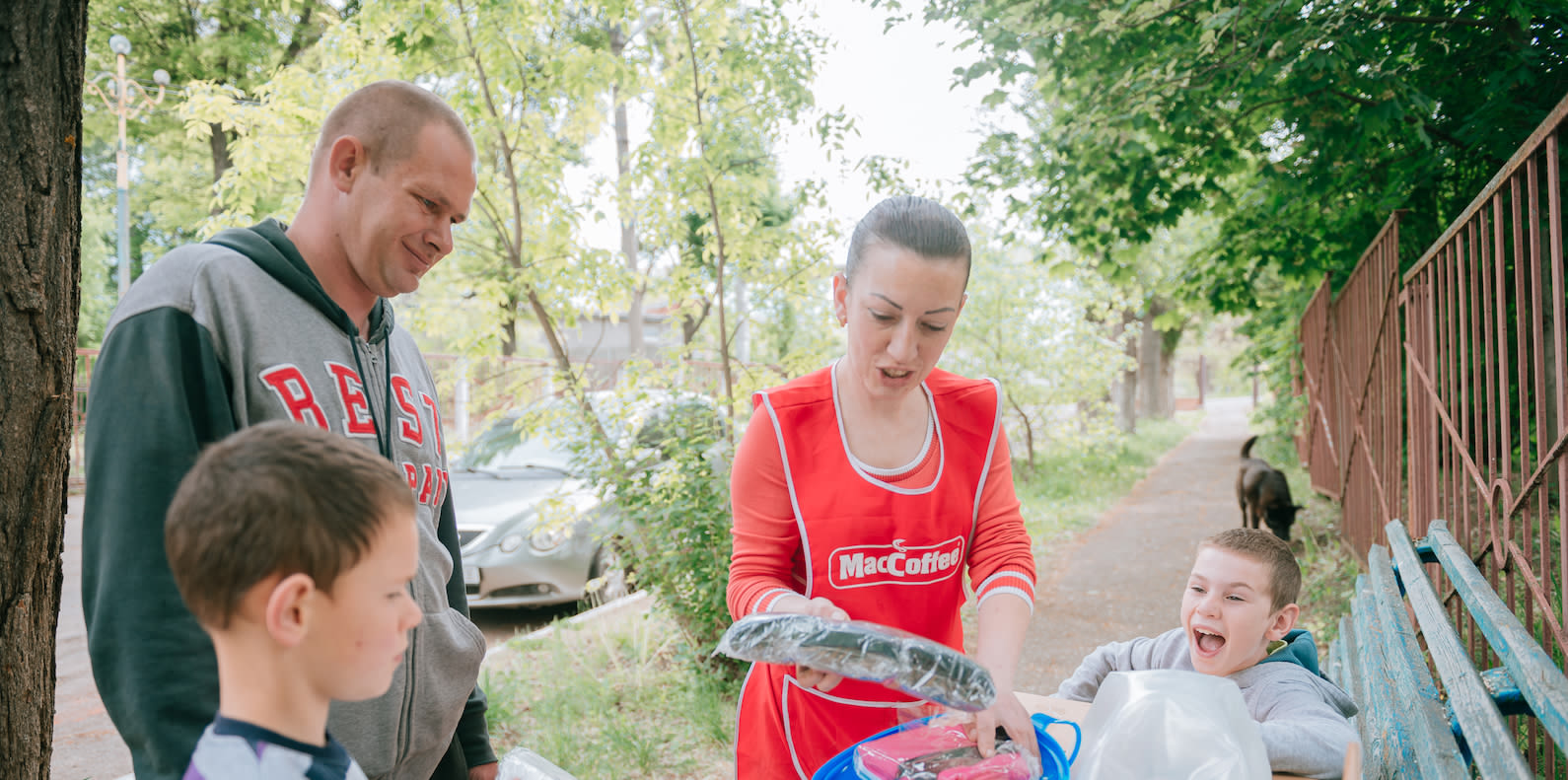
February 22, 2023
Flexport.org’s Ukraine Relief Effort in Review: Building Agile Supply Chains is Key to Saving Lives
Tags:
Flexport.org’s Ukraine Relief Effort in Review: Building Agile Supply Chains is Key to Saving Lives
About the Authors: David Ashley is the Head of Global Aid for Flexport.org, overseeing its relief efforts. Kristen Dohnt is the overall Head of Flexport.org.
Over the past year, Flexport.org has delivered 14.5 million pounds of aid to help improve the lives of ~8 million Ukrainians impacted by the ongoing humanitarian crisis. We partnered with over 30 humanitarian aid organizations, including UNICEF*, the International Organization for Migration, Save the Children, and Project C.U.R.E.. Along the way, we have learned a lot about the role of the supply chain in helping those in need during a major crisis and effective ways to drive agile, swift, and impactful responses.
The crisis in Ukraine and the corresponding humanitarian disaster continue unabated, with significant challenges for bringing in and distributing aid supplies. The work is not finished, we must continue our collective efforts in providing logistical and funding support to relief organizations and recommit ourselves to helping Ukrainians impacted by the conflict.
What We Have Accomplished Together
Jumping into action at the start of the crisis in February 2022, we have empowered our nonprofit partners to deliver critical, life-saving aid to Ukrainians in need. Bringing in supplies from both Europe and around the world, we delivered 824 shipments consisting of $100 million worth of humanitarian aid supplies to Ukraine, Poland, Moldova, Hungary, Romania and Slovakia. These shipments included hospital beds, medical and surgical equipment, hygiene kits, blankets, food, and ambulances. We even delivered firefighter equipment for the nonprofit Nova Ukraine and entire solar-powered medical clinics retrofitted from shipping containers (“Clinics in a Can”) together with Heart to Heart International.
Learn more about our global aid efforts through Flexport.org’s aid tracker.
Agility is Key in Time of Crisis
In order to provide this wide-ranging impact, agility has been key. As the conflict evolved and the needs and realities on the ground changed over time, we had to adapt our support. When food became particularly scarce in certain regions and when generators, winter boots and coats became urgently needed to support winterization efforts, we quickly provided customs and compliance guidance for newly required supplies and shared learnings across our partners for a faster response. Monitoring the situation and listening closely to the items requested by our humanitarian partners also allowed us to generate new important aid donations. For example, early on, it became clear that premature births were becoming more common with the stress of so many Ukrainians huddled in bomb shelters across the country. In response, after delivering several initial shipments of critical baby warmers to Ukraine, we connected our partner Embrace with several other NGOs to significantly increase distribution of this life-saving product.

A portable infant warmer at Sumy’s Regional Perinatal Center. New-borns in Ukraine need a special temperature regime – and peace in their country. Photo Credit: © UNICEF/UN0678689/Aleksey Filippov
At the same time, the volatile security situation in Ukraine and changing market conditions have required flexible and innovative operational solutions to quickly and reliably deliver aid cargo. With many organizations flooding the main humanitarian corridors and access points into Ukraine from Poland, this lane faced heavy congestion and significant delays due to a backlog of trucks. In order to establish a strong and sustainable supply chain, we adjusted our plans and utilized the Slovakian and Hungarian border-crossings, including creating an expedited trucking route for temperature controlled supplies. We also leveraged our partner’s warehouse in Central Europe as a hub, expanding access to a variety of European ports of entry and creating a consolidation point for EU origin goods.
Collaboration is Critical for Navigating Complexity
Navigating the complex logistical challenges posed by the conflict has also required strong collaboration and communication between all involved shipping parties. Coordination among NGOs on the ground and our logistics partners has allowed us to react more swiftly to shipment exceptions, such as delays or customs issues, and provided a constant flow of data to inform our overall operational strategy. Flexport’s tech-enabled platform has further strengthened this coordination, bringing multiple nonprofit shipping partners together in our platform for greater visibility and streamlined communication. In addition, the shipment data our system collects has helped both us and our nonprofit partners identify areas for operational improvements across their supply chain and guide future planning and forecasting. By collaborating closely with our NGOs, donors and logistics partners and remaining agile, together we have accomplished a great deal over the past year in delivering life-saving aid to Ukraine.
More Work To Be Done, With Increased Challenges
We have delivered aid shipments every single week since the start of the conflict, at an average of 15 shipments per week. The demand for both shipping and funding support from our nonprofit partners has not slowed down. As long as the conflict continues, relief efforts will continue — supplies will need to be replenished and new items will need to be brought in to meet changing aid priorities.

In addition to the volatile security situation and the humanitarian realities of responding to an armed conflict, aid organizations face increased funding and operational challenges going forward. First, general donor fatigue is rising as the conflict persists with no end in sight. While global freight prices are falling, aid organizations may not benefit from a reduction in shipping costs given the urgency of their shipments and the lack of available air and trucking capacity into a disaster region. Moreover, logistics costs account for up to 80% of NGO budgets, making further and sustained support necessary to enable the continued relief efforts of our partners.
Second, while prepositioning cargo becomes increasingly important to sustain a long-term and resilient Ukraine response, these shipments are often overlooked by donors because they aren’t immediately going to people in need. As the conflict drags on, strategically prepositioning supplies in advance and maintaining these stockpiles is necessary to account for changing needs across the region and respond more quickly and efficiently.
Third, additional ongoing and new global crises are stretching humanitarian organizations’ capabilities both financially and operationally. As with most long-term disasters, responding to the conflict in Ukraine becomes more difficult as other global needs increase and gain priority. Many of our nonprofit partners providing aid in Ukraine have also been responding to the food crisis in the Horn of Africa, the flooding in Pakistan, and the recent earthquakes in Turkey and Syria.
The Road Ahead
Concurrent disasters can also impact each other more directly, as supplies that were prepositioned and intended for Ukraine are instead sent to help those in Turkey. We’ve recently seen some of our aid partners do this for essential personal hygiene kits and other items. On top of that, Turkey was also an important supply hub for Ukraine. We had generators destined to provide heat for Ukrainians during winter that were destroyed in the Turkey earthquakes. More aid is going to be needed in more areas now and throughout 2023 as these multiple responses continue.
Flexport.org remains as dedicated as ever to shipping aid supplies to Ukraine and leveraging our Flexport.org Fund to unlock greater and quicker assistance. We are continuing to prioritize agility and collaboration to respond to the changing needs on the ground. By understanding the increased challenges faced by responding humanitarian aid organizations, including what they need to build and sustain effective supply chains into Ukraine and the surrounding region, we can more effectively empower a long-term response.
*UNICEF does not endorse any company, brand, product, or service.
About this author



